Political, Muslim and leaders of other faiths expressed their disgust at deadly shootings at two mosques in New Zealand on Friday as some revealed their citizens had been caught up in the bloodshed.
The timing of the shootings in the city of Christchurch, during Friday prayers, and the posting on social media of what appeared to be live, point-of-view video footage of the assault by a gunman added to the distress of many.
Saudi Arabia
Saudi Arabia’s King Salman and Crown Prince Mohammed bin Salman offered their condolences to New Zealand’s government after the terrorist attacks on two mosques in the country.
King Salman on Friday sent a cable of condolences to the Governor-General of New Zealand Batsy Reddy for the victims of Friday’s terror attack on two mosques in Christchurch.
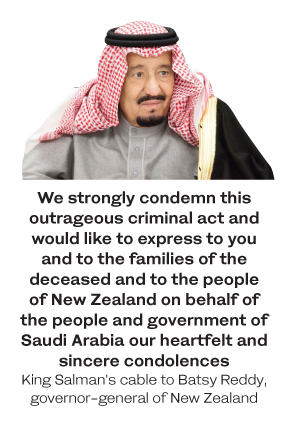 "We strongly condemn this outrageous criminal act and would like to express to you and to the families of the deceased and to the people of New Zealand on behalf of the people and government of Saudi Arabia our heartfelt and sincere condolences.”
"We strongly condemn this outrageous criminal act and would like to express to you and to the families of the deceased and to the people of New Zealand on behalf of the people and government of Saudi Arabia our heartfelt and sincere condolences.”
He assured the Kingdom’s support for New Zealand and said that the terrorist attack was condemned by “all religions and international conventions.”
"The heinous massacre of the worshipers at mosques in New Zealand is a terrorist act and underlines the responsibility of the international community to confront the rhetoric of hatred and terrorism, which is not recognized by religions or values of coexistence among peoples," said King Salman via his official Twitter account.
An official source at the Saudi Foreign Ministry also condemned in the strongest terms the terrorist attack. 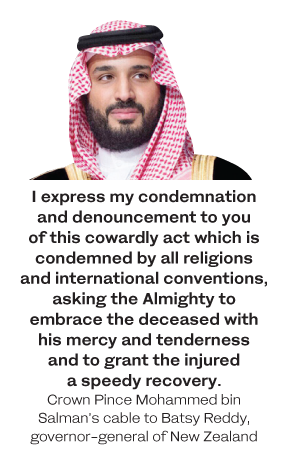
The source reiterated Saudi Arabia's condemnation of terrorism in all its forms, regardless of its source, and said that terrorism has no religion and no homeland. It emphasized the Kingdom's position that religions should be respected.
Saudi Arabia has repeatedly warned of racist and anti-cultural rhetoric at the national level, and has called on some governments to adopt balanced rhetoric and policies that contribute to the integration of Muslims into the societies of these countries.
Speaking in Geneva, Dr. Fahd Al-Mutairi, head of Human Rights Section at the Kingdom’s Permanent Mission to the UN office in Geneva, took the opportunity to express his deepest condolences to the victims of the terrorist attack in the Christchurch mosques.
Al-Mutairi expressed concern about some racist speeches and policies in some countries, including Australia, Iceland, New Zealand, Canada, the Netherlands, Belgium, Germany, France, Britain, Norway, Denmark and Sweden.
Al-Mutairi expressed the Kingdom’s deep concern about the leniency and favoritism of some of those who support the rhetoric of extremism, hatred and violence, as “there are those who welcome these despicable speeches in some parliaments of these countries, while welcoming the pretext of freedom of opinion and expression.
“We call on these countries to pass laws that limit racism against Muslims,” he added.
UAE
Anwar Gargash, the UAE’s Minister of State for Foreign Affairs, tweeted “heartfelt condolences” to New Zealand on Friday.
Gargash wrote: “Our collective work against violence & hate must continue with renewed vigor. Our thoughts & prayers are with the families of the victims.”
Kuwait
Kuwait supports New Zealand and all measures it takes to maintain its security and the safety of its citizens and residents on its territory, the Kuwaiti Foreign Ministry said.
Oman
The sultanate affirmed its firm stance of rejecting all forms of violence, terrorism, hatred and racism against innocent people, and expressed its sincere condolences to the families of the victims.
Turkey
Turkish President Tayyip Erdogan’s spokesman condemned what he called a “racist and fascist” attack.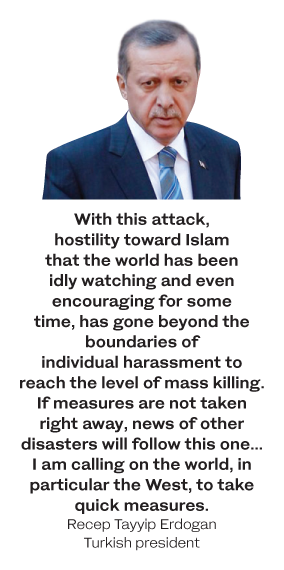
“This attack shows the point which hostility to Islam and enmity to Muslims has reached,” Ibrahim Kalin wrote on Twitter.
“We have seen many times Islamophobic discourse against Islam and Muslims turning into a perverse and murderous ideology. The world must raise its voice against such discourse and must say stop to Islamophobic fascist terrorism,” he said.
Jordan
Jordanian State Minister for Media Affairs Jumana Gneimat emphasized the country’s “rejection of terrorism and the assault of those living in peace and places of worship.”
Egypt
Egypt condemned the terror attack in New Zealand and demanded that the names of victims be disclosed immediately.
Saudi Arabia’s Council of Senior Scholars
Saudi Arabia’s Council of Senior Scholars strongly condemned on Friday the horrific incident that targeted worshippers in two mosques in New Zealand, resulting in dozens of people being killed and injured.
It called on “the world, its organisations and institutions to criminalise racist speech as soon as possible because it nourishes extremism and terrorism, and leads to such brutal terrorist incidents.”
The council also emphasized that hate speech should be fought because it does not serve peace and security which is what the world wants.
Al-Azhar Mosque
The Grand Imam of Al-Azhar Sheikh Ahmed Al-Tayeb condemned the terrorist attack on mosques in Christchurch, New Zealand.
Al-Azhar warned in a statement that the attack is a serious indicator of the consequences of the escalation of hate speech, xenophobia and the spread of Islamophobia in many European countries, stressing the need not to tolerate the racist groups committing such abhorrent acts.
Muslim World League
The Muslim World League expressed its deep sorrow and condemnation at the terrorist operation that claimed dozens of lives and injuries in some mosques in New Zealand, which clearly reflected one of the worst forms of inciting hatred in a world that is most in need of circumventing the values of love, harmony and peace.
The Secretary-General and Chairman of the World Council of Muslim Scholars, Sheikh Dr. Mohammed bin Abdul Karim Al-Issa, said that this barbaric work is added to the parallel models of the acts of Daesh and Al-Qaeda. The league always emphasizes the importance of tackling extremism and counter-extremism. In particular, the enactment of legislation that prevents all forms of incitement of hatred, including religious and ethnic contempt.
The Secretary-General of the Association confirmed his confidence in the New Zealand government to bring those involved in this crime to justice and to prosecute them as terrorists.
Arab League
The Arab League strongly condemned the terrorist attack on two mosques in Christchurch, New Zealand.
United Nations
The Secretary-General of the UN Antonio Guterres is appalled by the terror attacks in New Zealand and said there is an urgent need to work better globally to tackle Islamophobia, a spokesman said.
Egypt's Coptic Church
Egypt's Coptic Church condemned the terrorist attack on two mosques in New Zealand.
Morocco
Morocco strongly condemned the terrorist attack on two mosques in New Zealand.
Indonesia
“Indonesia strongly condemns this shooting act, especially at a place of worship while a Friday prayer was ongoing,” Foreign Minister Retno Marsudi said in a statement.
She was earlier cited by media as saying six Indonesians had been inside the mosque when the attack occurred, with three managing to escape and three unaccounted for.
Indonesia’s ambassador to New Zealand, Tantowi Yahya, told Reuters inquiries were being made as to whether Indonesians were caught up in the attack. There are 331 Indonesians in Christchurch, including 134 students, the foreign ministry said.
Malaysia
In Muslim-majority Malaysia, Anwar Ibrahim, the leader of the biggest party in its ruling coalition, said one Malaysian had been wounded in the attack he described as a “black tragedy facing humanity and universal peace.”
“I am deeply saddened by this uncivilized act, which goes against humanistic values and took the lives of civilians,” he said in a statement.
“We extend our deepest sympathies and condolences to the families of the victims and the people of New Zealand.” 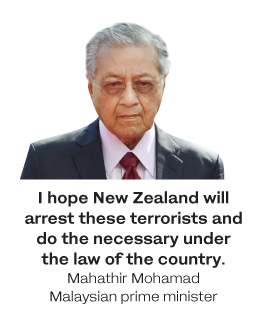
The Malaysian Prime Minister Mahathir Mohamad said that “I hope New Zealand will arrest these terrorists and do the necessary under the law of the country.”
Iran
Iranian state TV Friday said a spokesman of the foreign ministry, Bahram Ghasemi, condemned the shootings as a “terrorist attack.”
Iran’s ambassador to New Zealand, Jalaleddin Namini, told Iranian state TV that there were no Iranian nationals among those killed or wounded. However, Namini said he is still waiting for a confirmed list of the victims.
Afghanistan
Afghanistan’s ambassador to Australia, New Zealand and Fiji, Wahidullah Waissi, said on Twitter three Afghans had been wounded.
“My thoughts are with the family of Afghan origin who’ve been shot and killed at this heinous incident.”
Pakistan
Pakistan’s foreign ministry spokesman Mohammad Faisal condemned the incident on social media, using the hashtag #pakistanagainstterror.
Bangladesh
Bangladeshi Prime Minister Sheikh Hasina has sent a message to her New Zealand counterpart, Jacinda Ardern, expressing her “deep shock” and condemnation of the attacks on two mosques in Christchurch.
Hasina’s press wing said the prime minister reached out to Ardern on Friday.
An international cricket match between New Zealand and Bangladesh has been canceled after players from the visiting team narrowly avoided a mass shooting at one of the mosques.
Bangladesh’s cricket board president says the team is safe in a locked hotel in Christchurch.
Meanwhile, other world leaders have also reacted to the terrorist attack, which New Zealand Prime Minister Jacinda Ardern described as “one of New Zealand’s darkest days.”
United States
US President Donald Trump is expressing “warmest sympathy and best wishes” to the people of New Zealand after “the horrible massacre in the Mosques.”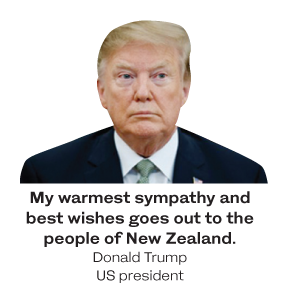
Trump tweeted Friday as the White House issued a statement condemning the attacks at two mosques.
White House press secretary Sarah Sanders described the attack as a “vicious act of hate.” She says the US stands in “solidarity” with the people of New Zealand.
Trump tweeted that “innocent people have so senselessly died” and added: “The US stands by New Zealand for anything we can do. God bless all!“
Russia
“An attack against peaceful people gathering for prayer is shocking in its cruelty and cynicism,” Russian President Vladimir Putin said.
“I hope that those involved will be severely punished,” he said in a message to Arden.
European Union
“Harrowing news from New Zealand overnight” said EU Council president Donald Tusk. “The brutal attack... will never diminish the tolerance and decency that New Zealand is famous for.”
“The European Union will always stand with New Zealand and against those who heinously want to destroy our societies and our way of life,” the President of the European Commission Jean-Claude Juncker said.
United Kingdom
Queen Elizabeth II said she's “deeply saddened” by the “appalling” terrorist attacks.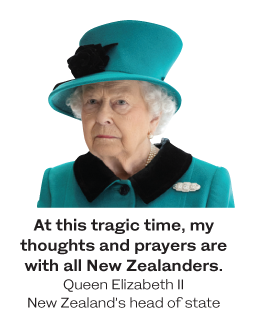
“I have been deeply saddened by the appalling events in Christchurch... At this tragic time, my thoughts and prayers are with all New Zealanders,” she said in a message.
“Prince Philip and I send our condolences to the families and friends of those who have lost their lives,” she said, paying tribute to emergency workers and volunteers providing support to the injured.
British Prime Minister Theresa May offered her deepest condolences “after the horrifying terrorist attack in Christchurch. My thoughts are with all of those affected by this sickening act of violence.”
Norway
The prime minister of Norway, which saw 77 people killed in a far-right attack eight years ago, has expressed solidarity with New Zealand after deadly attacks on two mosques.
Erna Solberg told Norwegian broadcaster NRK that “although it is across the globe, this is a strong reminder of how important it is for all of us to help bring down tensions, work against extremism, and that we show solidarity with each other when something like that happens.”
“This looks like it is a terrorist attack from the extreme right against immigrants and refugees,” Solberg said, adding it is “a reminder that we have to fight extremism in all forms.”
Germany
German Foreign Minister Heiko Maas said his country was “profoundly affected by the brutal crimes in Christchurch.”
German Chancellor Angela Merkel has sent a telegram to the prime minister of New Zealand, expressing her condolences.
“It is a perfidious attack on worshippers and their houses of prayer,” Merkel said Friday. “The attack on Muslim citizens is also an attack on New Zealand’s democracy and its open and tolerant society. We share these values and thus also the horror of the New Zealanders.”
Spain
Spanish Premier Pedro Sanchez said his thoughts were with the victims, families and government of New Zealand after terrorist attacks by “fanatics and extremists who want to destroy our societies.”
Italy
Italian Premier Giuseppe Conte has sent his condolences to the victims of the mosque attacks in New Zealand that left 49 dead.
Conte on Friday called the attacks “dreadful,” noting that the victims were “hit while they were in a place of prayer. All forms of intolerance, hatred and violence are inacceptable.”
France
France is increasing security measures at mosques and other religious sites after the deadly attack against two mosques in New Zealand.
French Interior Minister Christophe Castaner tweeted Friday that he ordered regional prefects to send patrols and reinforce surveillance of places of worship “as a precaution.”
French President Emmanuel Macron, also in a tweet, denounced the “odious crimes against the mosques in New Zealand” and said that France will work with international partners to fight terrorism.
“France stands against any form of extremism,” the country’s president Emmanuel Macron said.
The rector of the Grand Mosque of Paris condemned the attack in Christchurch, which left at least 49 dead.
France is home to western Europe’s largest Muslim community. While French Muslim and Jewish sites are sporadically targeted by vandals, France has not seen a major attack on mosques of the kind that targeted New Zealand.
Sweden
Sweden’s Foreign Minister Margot Wallstrom has tweeted that she was “shocked by the attack in Christchurch,” saying “we condemn terrorism in all forms.”
Danish Foreign Minister Anders Samuelsen also commented that “extremism has again shown its ugly face.”
Denmark’s Jewish community, which was targeted in a February 2015 attack where a guard was shot and killed, also expressed “shock” at the news of the New Zealand attack.
Hungary
Hungary’s president has sent a telegram to New Zealand’s governor-general expressing all Hungarians’ condolences to the families and friends of the victims’ in the “ruthless attack” against the two Christchurch mosques.
President Janos Ader said he was “deeply shocked” by the news and wished the injured a speedy and full recovery.
Ader said that “in these difficult hours, we all express our sympathies with those who mourn their loved ones lost in this pointless terror attack.”
Japan
Japan’s top government spokesman has offered his condolences to the victims of mosque attacks in New Zealand and says Japan stands by the people of that country.
Chief Cabinet Secretary Yoshihide Suga, in a regular news conference Friday, expressed “heartfelt condolences” to the shooting victims and their families, while extending sympathy for the injured.
Suga expressed “solidarity with the people of New Zealand.”
Japan’s Foreign Ministry issued an emergency safety advisory to Japanese nationals in the area, urging them to stay indoors and follow instructions from the local authorities.
The ministry also advised the Japanese in Christchurch to closely monitor local news “to secure your own safety.”
So far no Japanese have been affected by the attacks
Pope Francis
Pope Francis is denouncing the "senseless acts of violence" in the Christchurch mosque shootings and is praying for the Muslim community and all New Zealanders.
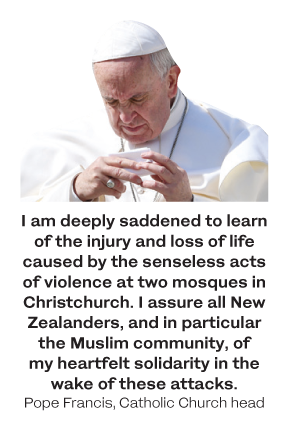 In a telegram of condolences Friday, Francis offered his solidarity and prayers to the injured and those who are mourning lost loved ones, and noted that it was a particularly difficult time for security and emergency personnel.
In a telegram of condolences Friday, Francis offered his solidarity and prayers to the injured and those who are mourning lost loved ones, and noted that it was a particularly difficult time for security and emergency personnel.
He said he was "deeply saddened to learn of the injury and loss of life cause by the senseless acts of violence at two mosques in Christchurch, and he assures all New Zealanders, and in particular the Muslim community, of his heartfelt solidarity in the wake of these attacks."
The message sent by the Vatican secretary of state ended by saying: "Commending those who have died to the loving mercy of Almighty God, Pope Francis invokes the divine blessings of comfort and strength upon the nation."
























